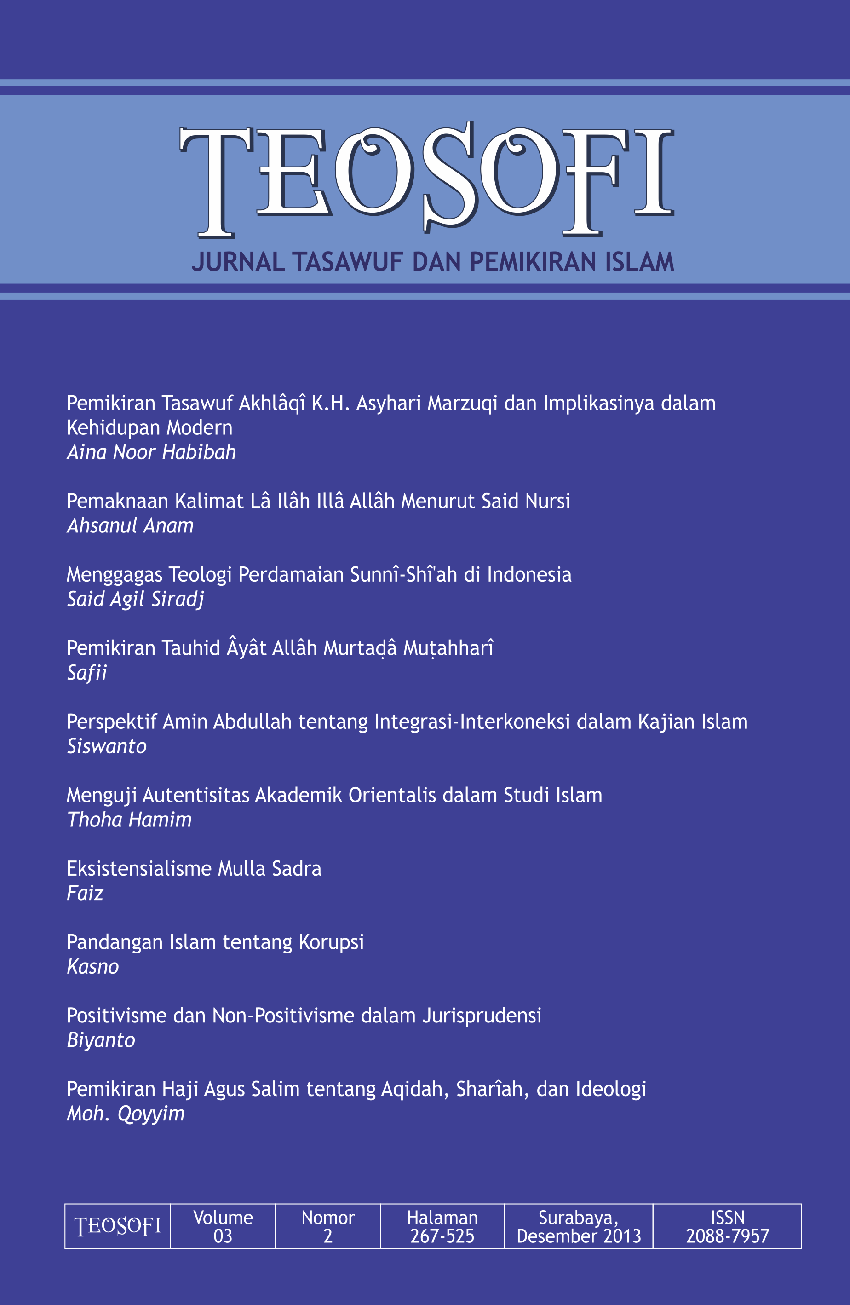Pemaknaan Kalimat Lâ Ilâh Illâ Allâh Menurut Said Nursi
Main Article Content
Abstract
This article explores the ideas of Said Nursi meaning of the phrase “Lâ ilâh illa Allâh”. The article concludes that God is perfect and He is there without a cause, because if there is a reason for him that means the dependency does not make perfect. God was the first manifestation of the most sublime. Therefore, God is the substance most original and ever-present. His essence itself be a sufficient cause for the manifestation of His eternity. For Said Nursi, the human mind may not be able to understand God directly. Therefore, there needs to be an explanation of God’s creation. Nursi interpret the phrase la ilaha illallah which makes everything that exists in this universe like a meaningful pieces that reflect the unity of God as Rabb al-‘Âlamîn. By knowing his creation, it will be easy to know God.
Downloads
Article Details
Licensing
© The Author(s). Published by Department of Aqidah and Islamic Philosophy, Faculty of Ushuluddin and Philosophy, Sunan Ampel State Islamic University Surabaya, Indonesia.
This is an Open Access article distributed under the terms of Attribution-NonCommercial 4.0 International (CC BY-NC 4.0).
References
Abu Rabi’, Ibrahim (ed.). Islam at the Crossroads. Albany: State University of New York, 2003.
------. & Smith, Jane I. (eds.). “Special Issue Said Nursi and the Turkis Experience” The Muslim World, Vol. LXXXIV, No. 3-4, July-Oktober, 1999.
Afandi, Ahmad Najib. 39 Tokoh Madrasah Tasawuf Baghdad. Brebes: Pustaka al-Hikmah, 2004.
Aqib, Kharisuddin. Al Hikmah: Memahami Teosofi Tarekat Qadiriyah wa Naqshabandiyah. Surabaya: Dunia Ilmu, 1998.
Atiyeh, George N. Al-Kindi: The Philosopher of the Arab. Rawal Pindi: Islamic Research Institut, 1996.
Bagus, Lorens. Kamus Filsafat. Jakarta: Gramedia, 2002.
Hanafi, A. Pengantar Theologi Islam. Jakarta: PT. al-Husna Zikro, 1995.
‘Imârah, Muhammad. Tayyârât al-Fikr al-Islâmî. Beirut: Dâr al-Shurûq, 1911.
Kartanegara, Mulyadhi. Menembus Batas Waktu. Bandung: Mizan, 2005.
Musa, Yusuf. al-Qur’an dan Filsafat, terj. Ahmad Daudy. Jakarta: Bulan Bintang, 1988.
Mustofa, A. Filsafat Islam. Bandung: Pustaka Setia, 2007.
Nasr, Seyyed Hossein (ed.). Islamic Spirituality: Manifestation. New York: Crossroad, 1991.
Nasution, Harun. Falsafah dan Mistisisme dalam Islam. Jakarta: Bulan Bintang, 1990.
Nursi, Said. Iman Kunci Kesempurnaan, terj. Muhammad Mishbah. Jakarta: Robbani Press, 2004.
------. Letters, terj. Sukran Vahide. Istanbul: Sozler Nesriyat, 2001.
------. Mengokohkan Aqidah Menggairahkan Ibadah, terj. Ibtidain Hamzah Khan. Jakarta: Robbani Press, 2004.
------. Misteri Keesaan Allah, terj. Dewi Sukarti. Jakarta: Erlangga, 2010.
------. Risalah al-Nur: Sinar yang Mengungkap Sang Cahaya, terj. Sugeng Hariyanto dkk. Jakarta: Grafindo Persada, 2003.
------. The Flashes. Istanbul: Sozler Nesriyat, 2000.
------. The Rays, terj. Sugeng Hariyanto dkk. Istanbul: Sozler Nesriyet, 1998.
------. The Words. Istanbul: Sozler Nesriyet, 2002.
Rahman, Fazlur. Islam. Bandung: Pustaka, 1984.
------. Tema Pokok al-Qur’an, terj. Anas Mahyuddin. Bandung: Pustaka, 1996.
Rijal, Syamsul. Bersama al-Ghazali Memahami Filosofi Alam. Yogyakarta: Arruzz Book Galery, 2003.
Saeed, Abdullah. Islamic Thought: An Introduction. USA dan Canada: Routledge, 2006.
Salih, Ihsan Kasim. Said Nursi Pemikir dan Sufi Besar Abad 20, terj. Nabilah Lubis. Jakarta: Raja Grafindo Persada, 2003.
Shihab, M. Quraish. Wawasan al-Qur’an. Bandung: Mizan, 1996.
Siradj, Said Aqiel. “Tauhid dalam Perspektif Tasawuf”, Jurnal Islamica, Vol. 5, No. 1, September 2010.
Syahrastani, Asy. al-Milal wa al-Nihal, Aliran-aliran Teologi dalam Sejarah Umat Islam, terj. Asywadie Syukur. Surabaya: PT.Bina Ilmu, t.th.
Thahan, Musthafa M. Model Kepemimpinan dalam Amal Islam, terj. Mustalah Maufur. Jakarta: Robbani Press, 1997.
Vahide, Sukran. Biografi Intelektual Bediuzzaman Said Nursi. Istanbul: Sozler Nesriyat, 2000.
Zarkasyi, Amal Fathullah. Dhât dan Sifah Tuhan dalam Konsep Tauhid Mu‘tazilah, Jurnal Islamica, Vol. 5, No. 1, September 2010.

